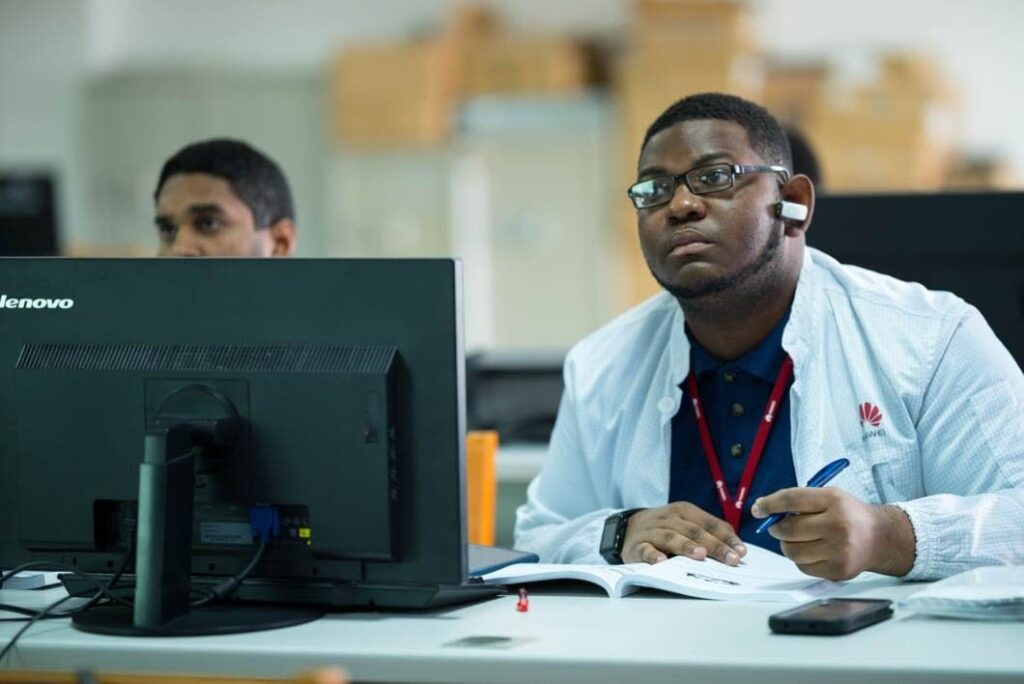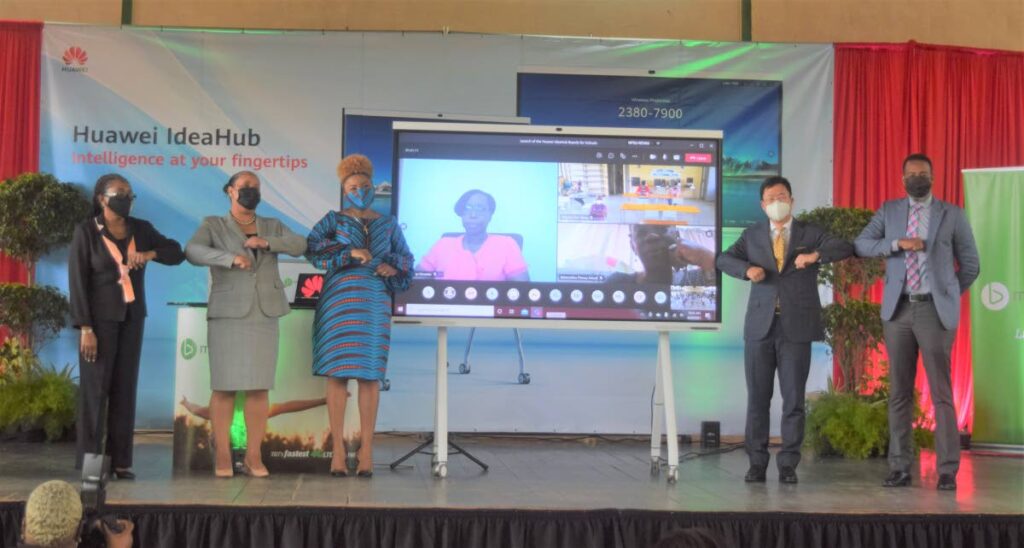Huawei eyes local, global opportunities in 2022

Huawei's commitment to the Caribbean Basin continued in 2021with several projects to deepen economic and technological development in the region. With a comprehensive focus across youth, education, sport, carbon reduction and women in ICT and digital economy, the global technology firm has leveraged its offices based in Trinidad and Tobago and Jamaica to display its commitment to Caribbean islands.
This commitment is also present globally in other markets of operation where the company moved from 49th to 44th place on Fortune Global 500 and ranks 8th in the Forbes World's Best Employers for 2021.
Guo Ping, rotating chairman, Huawei, recognised the challenges facing global citizens in the company's 2022 New Year's Day Message, noting that it was a year of "all hands on deck." The Huawei global team faced unprecedented challenges ranging from "50ºC temperatures in Kuwait" to "mosquito tornadoes" in Malawi but remained committed and undeterred from their missions at hand across the world.
The rotating chairman also recognised the opportunities at hand, adding, "The digital economy has become a major engine of global economic growth, and green and low-carbon technologies have become new drivers for sustainable development. This combination of digital transformation and green development presents the information and communication technology industry with incredible new opportunities."
With national digital transformation set as a mandate by the governments of many Caribbean countries, including Trinidad and Tobago, Huawei made many local inroads into supporting this objective. Huawei signed an MOU with Canto, the TT-based regional non-profit association made up of operators, organisations, companies, and individuals in the telecommunications sector in 2021.
The agreement, which also includes support for other territories in the Caribbean region, is primarily for knowledge transfer in the ICT arena, especially those stemming from the Fourth Industrial Revolution. It includes artificial intelligence, Cloud technologies, the Internet of Things and cyber security, and more people-centred topics, including gender equality in technology fields, clean energy, and digital talent development. Mark Xue, vice president of Huawei Latam and the Caribbean, has noted that Huawei's core theme of regional operation is "In Caribbean, For Caribbean."
Huawei also brought its leading-edge technology to partnerships with local telecommunications operator TSTT | bmobile, bringing best-in-class consumer technology, including the Huawei IdeaHub, to local businesses; also partnering with the Ministry of Education to donate several of these smart boards to schools across the country.
The company also continues to position itself as a supporter of Women in Tech and other local ICT talent development initiatives such as Seeds for the Future – training over 70 TT university students in the past six years in the latest technology developments like 5G and artificial intelligence – ensuring that tech-savvy and innovative young people have the skills needed to be competitive in workplaces of the future.
Huawei also continued its local internship programme, taking on nine fresh university graduates in 2021, as it recognises its own need to attract top-tier talent. Huawei also recognises the potential ICT can have in areas such as sport, having signed an agreement in 2021 with the Queen's Park Cricket Club to bring WiFi 6 and data and technology to support the vision of transforming the world-famous Queen’s Park Oval into a 21st century eco-friendly, wireless stadium.
Internationally the company also achieved worthy milestones, including the launch of HarmonyOS, the company's flagship operating system. HarmonyOS now empowers more than 320 million
Huawei devices, including eyewear, watches and other mobile devices and will soon also power

smart travel through HarmonyOS Smart Cockpit. Huawei also reached a license agreement with an international supplier of Volkswagen Group. Song Liuping, chief legal officer of Huawei, highlighted, "We expect more than 30 million vehicles to be licensed under its patents based on existing licence agreements, and this includes our 4G standard essential plans which covers vehicles equipped with wireless connectivity." Over the past 20 years, Huawei has conducted extensive cross-licensing negotiations with key patent holders in the ICT industry and has entered into more than 100 patent licence agreements with major global ICT companies across Europe, the US, Japan, and South Korea. Huawei has one of the largest patent portfolios in the world.
Huawei has also invested heavily in the fast-growing health and wellness sector. The company's largest health lab to date: a 4,680 m2 facility at Songshan Lake opened in 2021 in Dongguan, China, for R&D, professional research, testing and health and fitness scenario testing. There are currently more than 83 million global average monthly active users of the Huawei Health App.
Recognising the global effort to reduce carbon emissions, the company also seeks to contribute through core skills and products in technology.
According to Eric Xu, deputy chairman, "ICT is expected to help other industries cut carbon emissions by 12.1 billion tonnes by 2030. That is roughly ten times the amount emitted by the ICT industry itself. Huawei's share in global ICT infrastructure currently stands at more than 30 per cent. We are a major supplier of ICT infrastructure. We have always believed that the biggest value that Huawei can bring to advance the green agenda is to keep pursuing technological innovation to help all industries reduce their energy consumption and achieve low-carbon development."
The company ethos in this aspect is to "use bits to manage watts" and bring power savings to data centres and other ICT infrastructure as the world becomes increasingly reliant on data and processing power for daily activity and commerce.
Guo Ping put it best, "We will also increase our investment in core digital power technologies and move forward with a dual-wheel strategy where we develop clean energy solutions while facilitating the digitalisation of traditional energy. Cutting costs won't pave the way to sustainable survival. Only through strategic investment can we grow stronger and build a future for ourselves."
Despite the challenges of the times, Huawei maintains an optimistic view for the year ahead.
Continuing in the company's New Year's message, Guo Ping added, "2022 will come with its fair share of challenges, but we will keep working closely with our global partners to overcome the difficulties we face, improve business performance, and strengthen our foundations. We will continue investing in the future and creating value for our customers and partners. In the end, we will not only survive, but do so sustainably."
He acknowledged that "the road ahead is long and hard" but highlighted, "As long as we press ahead, we will reach our destination. With unwavering effort, we will build a promising future."


Comments
"Huawei eyes local, global opportunities in 2022"